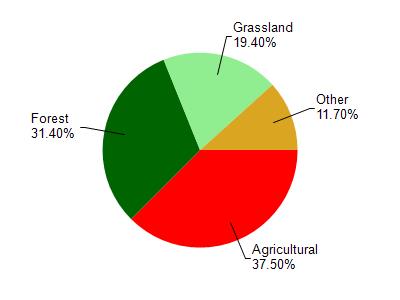Dunn
Yes
No
No
Fish and Aquatic Life
Overview
The upper portion of Gilbert Creek has an excellent native brook trout population. Streambank
easements have been recommended to protect these waters. Farther downstream, best management
practices could control runoff that may be contributing to higher stream temperatures, undesirable
for trout (WDNR 1982).
Date 1996
Author Aquatic Biologist
General Condition
Gilbert Creek (WBIC 2064600) was assessed during the 2018 listing cycle; new biological (fish Index of Biotic Integrity (IBI) scores) and temperature sample data were clearly below the 2018 WisCALM listing thresholds for the Fish and Aquatic Life use. This water was meeting this designated use and was not considered impaired.
Date 2017
Author Ashley Beranek
Condition
Wisconsin has over 84,000 miles of streams, 15,000 lakes and milllions of acres of wetlands. Assessing the condition of this vast amount of water is challenging. The state's water monitoring program uses a media-based, cross-program approach to analyze water condition. An updated monitoring strategy (2015-2020) is now available. Compliance with Clean Water Act fishable, swimmable standards are located in the Executive Summary of Water Condition in 2018. See also the 'monitoring and projects' tab.
Reports
Recommendations
Citizen-Based Stream Monitoring
Collect chemical, physical, and/or biological water quality data to assess the current overall stream health. The data can inform management decisions and may be used to identify impaired waters for biennial lists.
Fisheries Trout Stream Habitat Maintenance and Development
The Ojibleau Chapter of Trout Unlimited proposes to restore 4000 feet of trout stream. Major project elements to include: 1) reshaping and stabalization of eroded streambanks, 2) dredging of silted-in pools, 3) improvement of streamflow from feeder creek, and 4) placement of wiers and lunker structures.
Fisheries Trout Stream Habitat Maintenance and Development
The Ojibleau Chapter of Trout Unlimited proposes to restore 4000 feet of trout stream. Major project elements to include: 1) reshaping and stabalization of eroded streambanks- 2) dredging of silted-in pools- 3) improvement of streamflow from feeder creek- and 4) placement of wiers and lunker structures.
Fisheries Trout Stream Habitat Maintenance and Development
Trout Unlimited, Ojibleau Chapter, proposes to restore trout habitat in a 3,300 ft. section of Gilbert Creek and a 330 ft. stretch of a tributary stream, both in the Town of Lucas in Dunn County. Major project elements incude: 1) bank stabalization, 2) placement of lunker structures, 3) removal of remnants of a spring house, 4) and installation of a gravel crossing or culvert to improve fish migration.
Fisheries Trout Stream Habitat Maintenance and Development
Trout Unlimited- Ojibleau Chapter- proposes to restore trout habitat in a 3-300 ft. section of Gilbert Creek and a 330 ft. stretch of a tributary stream- both in the Town of Lucas in Dunn County. Major project elements incude: 1) bank stabalization- 2) placement of lunker structures- 3) removal of remnants of a spring house- 4) and installation of a gravel crossing or culvert to improve fish migration.
Management Goals
Wisconsin's Water Quality Standards provide qualitative and quantitative goals for waters that are protective of Fishable, Swimmable conditions [Learn more]. Waters that do not meet water quality standards are considered impaired and restoration actions are planned and carried out until the water is once again fishable and swimmable
Management goals can include creation or implementation of a Total Maximum Daily Load analysis, a Nine Key Element Plan, or other restoration work, education and outreach and more. If specific recommendations exist for this water, they will be displayed below online.
Monitoring
Monitoring the condition of a river, stream, or lake includes gathering physical, chemical, biological, and habitat data. Comprehensive studies often gather all these parameters in great detail, while lighter assessment events will involve sampling physical, chemical and biological data such as macroinvertebrates. Aquatic macroinvertebrates and fish communities integrate watershed or catchment condition, providing great insight into overall ecosystem health. Chemical and habitat parameters tell researchers more about human induced problems including contaminated runoff, point source dischargers, or habitat issues that foster or limit the potential of aquatic communities to thrive in a given area. Wisconsin's Water Monitoring Strategy was recenty updated.
Grants and Management Projects
Monitoring Projects
| WBIC | Official Waterbody Name | Station ID | Station Name | Earliest Fieldwork Date | Latest Fieldwork Date | View Station | View Data |
|---|
| 2064600 | Gilbert Creek | 10021098 | 9b- ~1730 Feet D.S. Confluence W/North And South Branch Giblert | 4/19/2017 | 5/3/2017 | Map | Data |
| 2064600 | Gilbert Creek | 10011673 | Gilbert Creek - 9-Gilbert Creek. 50' U.S. Of Sth 29 | 6/21/2005 | 10/13/2016 | Map | Data |
|

Watershed Characteristics
Gilbert Creek is located in the Wilson Creek watershed which is 244.75 mi². Land use in the watershed is primarily agricultural (37.50%), forest (31.40%) and a mix of grassland (19.40%) and other uses (11.70%). This watershed has 425.11 stream miles, 1,332.74 lake acres and 5,388.38 wetland acres.
Nonpoint Source Characteristics
This watershed is ranked High for runoff impacts on streams, High for runoff impacts on lakes and High for runoff impacts on groundwater and therefore has an overall rank of High. This value can be used in ranking the watershed or individual waterbodies for grant funding under state and county programs.However, all waters are affected by diffuse pollutant sources regardless of initial water quality. Applications for specific runoff projects under state or county grant programs may be pursued. For more information, go to surface water program grants.